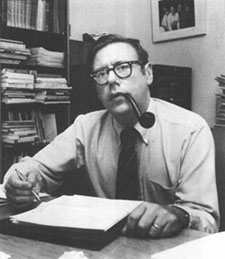Arthur Okun
(economist) | ||||||||||||
|---|---|---|---|---|---|---|---|---|---|---|---|---|
 | ||||||||||||
| Born | November 28, 1928 Jersey City, New Jersey, U.S. | |||||||||||
| Died | March 23, 1980 (Age 51) Washington D.C., U.S. | |||||||||||
| Nationality | US | |||||||||||
| Alma mater | Columbia University | |||||||||||
| Party | Democratic Party (United States) | |||||||||||
Chair of the Council of Economic Advisers 1968-1969
| ||||||||||||
Arthur Melvin "Art" Okun was an American economist. He was the chairman of the Council of Economic Advisers between 1968 and 1969. Before serving on the C.E.A., he was a professor at Yale University and, afterwards, was a fellow at the Brookings Institution in Washington, D.C. In 1968 he was elected as a Fellow of the American Statistical Association.[1]
Okun is known in particular for promulgating Okun's law, an observed relationship that states that for every 1% increase in the unemployment rate, a country's GDP will be roughly an additional 2% lower than its potential GDP. He is also known as the creator of the misery index, where it is assumed that both a higher rate of unemployment and a worsening of inflation create economic and social costs for a country.[2] He died on March 23, 1980 of a heart attack. [3]
References
- ↑ View/Search Fellows of the ASA, accessed 2016-08-20.
- ↑ Okun, Arthur M. (1975), Equality and Efficiency: The Big Tradeoff. Washington, D.C.: Brookings Institution, 1975, pp. 91–92.
- ↑ Arthur Okun Dies, Economic Adviser to Johnson, accessed 2020-08-14.
Wikipedia is not affiliated with Wikispooks. Original page source here